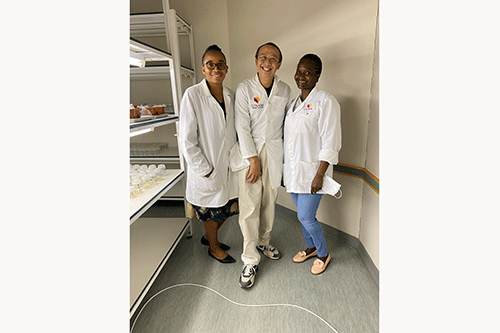OGONGO – In an effort to keep up with international trends and ensure local producers have access to world-class plant material, the University of Namibia Ogongo campus has revived its tissue culture laboratory – one of the few in the country.
A tissue culture laboratory is a structure that houses small plants that are grown in a climate chamber or growth chamber for research, breeding or multiplication.
It consists of media rooms, cutting rooms and growth chambers.
Although the laboratory has been in existence since the establishment of the institution, it has been dormant due to a lack of skills.
The facility was brought to life in June this year as part of the memorandum of understanding (MoU) on academic collaboration between the Gadjah Mada University in Indonesia and UNAM.
The facility will mainly focus on and address the shortage of available rootstocks and ensure quick multiplication of the desired plant material for the various sectors.
Renowned agriculture expert Pranowo Singgihsandjojo from Indonesia is one of the two experts invited to train the staff to improve their knowledge and skills of staff in handling plant culture tissue to support high-impact research activities and learn new techniques through the latest technology in explant culture.
“I am pleased to share my expertise and contribute to the growth of tissue culture in Namibia,” he said.
During the training, the trainees are given theoretical exposure to the basic introduction of plant culture tissue and practical training in the preparation of culture tissue media, sterilisation techniques and explant culture.
“The training is going well so far, and the trainees are learning so well; we can’t wait to see a fully-fledged tissue culture laboratory in Namibia run by Namibians. I hope next year I will invite my team to join me in Indonesia for an extensive experience and also practice for conventional propagation,” he said.
Singgihsandjojo is training about seven staff members from different departments of the institutions for three months
Speaking to New Era, one of the lab technicians in the department of crop production, Johanna Valombola, said she is thrilled to be part of a few technicians with an experience in tissue culture propagation.
“This is a once-in-a-lifetime experience, and I am excited to be part of the team,” she said.
Campus director Christopher Mberema said tissue culture is important for mass production and the commercialisation of rare crops.
“For example, sweet potato seeds are rare in Namibia, so through our laboratory, we can produce a variety of seeds. We are also thankful to the Indonesian embassy for assisting us in training our local laboratory technicians on tissue culture,” said Mberema.
– ashikololo@nepc.com.na



